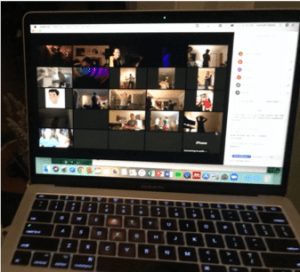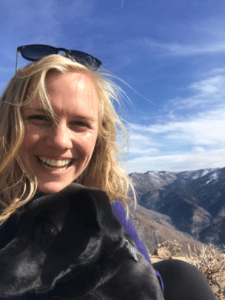The Wallace Stegner Center Environmental Dispute Resolution (EDR) Program recognizes that the coronavirus has created a wide range of challenges. We also think it has created an opportunity to reflect on how we operate as individuals and as a society and to be more intentional in our lives. To inspire reflection and intentionality, we are asking our EDR Blog readers: What is the coronavirus (which we have taken to referring to as Madame C) teaching you? If you are willing to share your reflections with other EDR Blog readers, please fill out this Google Form or send your thoughts to Angela Turnbow (angela.turnbow@law.utah.edu) by August 15, 2020. Reflections can be anywhere from a few sentences to 800 words. We will share submitted reflections individually or in batches via the EDR Blog to help foster a community of learning.
For more information and some prompts to reflect on, see our EDR Blog post What Lessons are you Learning from Madame C?
By Hannah Satein for EDRBlog.org

While I think we’ve all heard about some of the challenges of dating in the modern era, e.g. commitment-phobia, hectic schedules, and ghosting, I never expected that we would add “consent from roommates to progress new relationship” to the list. But in an effort to reduce transmission and respect boundaries, questions formally relevant only to two such as “Can I give you a hug?” or “Do you want to come over?” have become fodder for group negotiation and collaboration. Indeed, limiting the spread of the virus and providing care for those infected is requiring community and societal collaboration in unanticipated and unprecedented ways.
Get notified when new articles are posted to the EDR blog – sign up for our email list »
Just like in any collaboration, a cornerstone of the collaborative efforts around the coronavirus is dialogue and communication. As my example highlights, due to the coronavirus, many actions and choices that were once solely individual, now have potential ramifications for others; addressing these potential impacts is requiring more and novel conversations among friends, family, and roommates. In my own life, thoughts of visiting with friends, recreating outdoors, and pursuing travel plans have raised questions about the impacts of my choices on those close to me, as well as on the broader community, and this has created the need and opportunity for new conversations. As with all collaboration, strategies for effective communication such as asking questions, avoiding assumptions, listening actively, responding with intention, and the use of “I statements” can help facilitate positive and productive communication as we further consider the impact of our choices and actions.
Initiating these conversations or taking other actions in response to the coronavirus highlights the wisdom that leadership is a verb not a noun, as Heifetz, Grashow, and Linksy (2009) describe in The Practice of Adaptive Leadership. Heifetz et al. argue that the majority of us conflate positions of authority with leadership. However, they assert that a position of authority is not a requirement to exercise leadership nor is it a guarantee that leadership will be provided. Instead, leadership should be seen as a verb, not a noun, that anyone can put into action by helping others work towards a more positive future and navigate the discomfort of change. I think the coronavirus pandemic has given many opportunities for us to witness both sides of this coin: sometimes, sadly, how those with formal authority as leaders have failed to lead and much more positively, how many individuals have exercised leadership without any formal authority to do so such as the individuals who have voluntarily organized grocery delivery operations for vulnerable individuals. These examples and the ideas of Heifetz et al. offer us all a positive inspiration to step up and provide leadership in our own families, workplaces, and communities particularly in these unique and trying times.
Finally, a critical part of preparing to collaborate, communicate, or exercise leadership is getting yourself into the right state of mind. Practitioners and scholars emphasize that while research and planning are essential for negotiation and collaboration, ultimately what will occur once the participants are together is unknown and thus a negotiation or collaboration should not be approached with a rigid script as inevitably it will deviate from what is “written.” Thus, while it may be challenging for some of us type A personalities, an integral component of getting ready to effectively negotiate and collaborate is preparing yourself to be present and working to trust that you can handle whatever arises in the moment, as author William Ury (2015) advises in Getting to Yes with Yourself. Though the advice to prepare for a situation that cannot be fully known or anticipated is incredibly pertinent to life in general, it is particularly so when dealing with an unprecedented global pandemic. Therefore, as with the insights on the importance of dialogue and the opportunity to exercise leadership, I believe the advice to surrender the attempt to fully control or predict what will happen and instead focus on preparing yourself to be present and trust in your capabilities to respond is another valuable lesson for life in the time of corona.
 Hannah Satein is a second-year PhD student in the Metropolitan Planning, Policy, and Design program at the University of Utah. Hannah is working with Dr. Danya Rumore in the Environmental Dispute Resolution program and is passionate about studying and using the tools of collaboration and the mutual gains approach to negotiation to help make progress on the complex environmental issues we face. In her free time she loves exploring Utah’s outdoors with pups and friends.
Hannah Satein is a second-year PhD student in the Metropolitan Planning, Policy, and Design program at the University of Utah. Hannah is working with Dr. Danya Rumore in the Environmental Dispute Resolution program and is passionate about studying and using the tools of collaboration and the mutual gains approach to negotiation to help make progress on the complex environmental issues we face. In her free time she loves exploring Utah’s outdoors with pups and friends.
